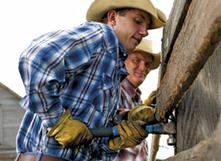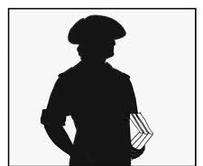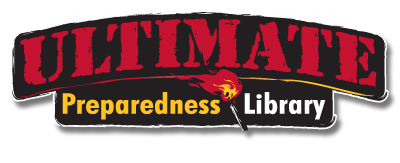AlreadyPrepared.com
Self-Reliance
DEVELOPING A SELF-RELIANT MENTALITY
The first thing you should learn before going out on your own, is more of a mind-set than a skill-set, but it is a very important building block that will lay the foundation for the rest of the more practical skills you need to be self-reliant. The first thing you should be concentrating on is developing is a self-reliant mentality.
Part of being a self-reliant patriot is taking care of yourself and making your own decisions. It isn’t until you’re out on your own that you realize how much you relied on others to make your life run smoothly.
While you might not be completely self-sufficient at this point in time, you can certainly be self-reliant in a number of areas in your life. For example, you shouldn’t need anyone else to remind you about important appointments or others to bug you about taking your car in to get a routine maintenance. You should be able to remember to do those things on your own yourself. A person with a self-reliant mentality doesn’t wait around for someone else to take care of things that need to be taken care of. If he encounters a problem, he takes the initiative and tries to figure out how to resolve it himself.
So how does a person develop a self-reliant mentality?
1. Assume responsibility...Start taking responsibility for your life and the things in it. If you’ve relied on others to wake you up every morning so you weren’t late to school or work, it’s time to make friends with the alarm clock on your smartphone. Start using a calendar to keep track of your appointments and important due dates. When you notice your apartment or dorm room is looking messy, clean it up. Don’t blame your teacher or your boss if you’re not doing well in a class or at work. If you make a mistake, own up to it, and try to make it right yourself instead of immediately running back to others so they can fix it for you.
Taking responsibility for your life isn’t all that hard. It requires doing things that are often boring, tedious, frustrating, and time-consuming. You’ll feel the burden of weighing a hard decision and accepting the consequences, even if they’re not favorable to you. You’ll often go un-praised and un-rewarded for being responsible.
But taking responsibility for your life is satisfying. You’ll gain a quiet confidence in yourself as you take control of your own life. You’ll feel empowered. Instead of feeling like life is simply happening to you, you’ll begin to feel like the captain of your destiny and master of your soul. As you assume responsibility for your life, you’ll notice doors open up to new and better opportunities. While you may notice that other people who don’t take responsibility for their lives seem to enjoy a life of worry-free ease, give it a few years: those same people will probably have progressed little and seem stuck in neutral. You can have little responsibility, a ton of fun and pleasure, and few life options, or a healthy amount of responsibility, a healthy amount of fun and pleasure, and a ton of life's options. While it’s easy to get along by having other people do everything for you, “the trouble is, when you’re not self-reliant, you’ll never do more than just get by.”
2. Be informed...Of course in order to take on more responsibilities, you have to know how to carry out those responsibilities. Some people continue letting others do things for them, with the excuse that they just don’t know how to do those things themselves. They often turn to others to make decisions for them for the same reason. But the truth is, they’ve never actually tried to figure things out on their own.
This excuse is especially weak in the age of the internet, with answers to many of life’s questions just a Google search away. Need to figure out how to apply for financial aid? Don’t pawn the job off on others get on the computer and start researching it yourself.
This isn’t to say that you should completely avoid other adults for advice and counsel. There are some problems or decisions Google just can’t help with. You should definitely take advantage of the pracical advice and wisdom of older people have acquired by asking for their input when making an important decision or trying to solve a problem.
However, you do not always have to make others a resource of first resort. We frequently turn to others when we don’t really want input — we want to be told what to do. And when others hear about our problem, they often want to take care of it for you. So investigate yourself first; try figuring things out on your own. Experience can be the best teacher. Once you’ve reached a wall, then go talk to others who may know more than you through their experiences in life. Because you’ve gotten your hands dirty with your issue, so to speak, you’ll be in a better position to ask them effective questions. Instead of feeling like a kid, you’ll feel more like a fellow traveler in the land of adulthood who’s simply looking for advice from someone who has already been there.
In situations where the stakes are high, turn to others sooner rather than later; oftentimes it’s better to learn from the mistakes of others, rather than making them yourself. But by always taking at least the first steps of intelligence gathering yourself whenever you can, you’ll grow and make discoveries you wouldn’t have otherwise.
The self-reliant person is always looking for a chance to learn and expand their knowledge and skills. They read books for their classes not because they have to, but because they want to. And whether they are in college or on the job, they also read regularly for knowledge as well as pleasure. They keep up with news and current events. They talk to others and really listen to them. They are very observant wherever they go. In this way, they build up a library of information that they can draw upon when making a decision or solving a problem.
3. Know where you’re going...A self-reliant and responsible person has goals that they set for themselves. Their aims are not merely those things other people think they should do. The self-reliant person is autonomous and doesn’t overly rely on others to validate their decisions. A self-reliant person works with an end in mind. They create a blueprint for their future. When they run into a problem, they inform themselves on what an ideal resolution would be and then work to make it a reality. They plan out their days and weeks and ensure tasks that they are responsible for are completed.
4. Make your own decisions...One thing we eventually learn the hard way is that life is actually much easier and a lot less stressful when we proactively make our own decisions. It’s tempting when we are younger to simply let life happen to us and hope that decisions and problems will magically resolve themselves. They won’t. In fact, problems and decisions ofen get bigger and harrier the longer we wait to take action on them. We need to make proactive decision-making a habit. With any choice or problem we may face, decide on an action plan quickly, and execute it immediately.
“In any moment of decision, the best thing you can do is the right thing, the next best thing is the wrong thing, and the worst thing you can do is nothing.” -Theodore Roosevelt
Also, while you should certainly seek advice from others to inform your decisions, don’t rely on them to make your decisions for you. It’s your life. Don’t let others live it for you.
Balancing Self-Reliance
Learning to be self-reliant takes time; you’re not magically transformed into a sage, totally autonomous adult the moment you turn 18. Rather, self-reliance is something you develop in stages as you get older, learn from experience, and become more and more independent.
All of which is to say, it’s best to grow into self-reliance in stages — concentrate on becoming self-reliant in whatever you can, wherever you’re at in life, in ways that don’t compromise your ability to gain more independence, which is a satisfying and ultimate goal for each and everyone one of us.














